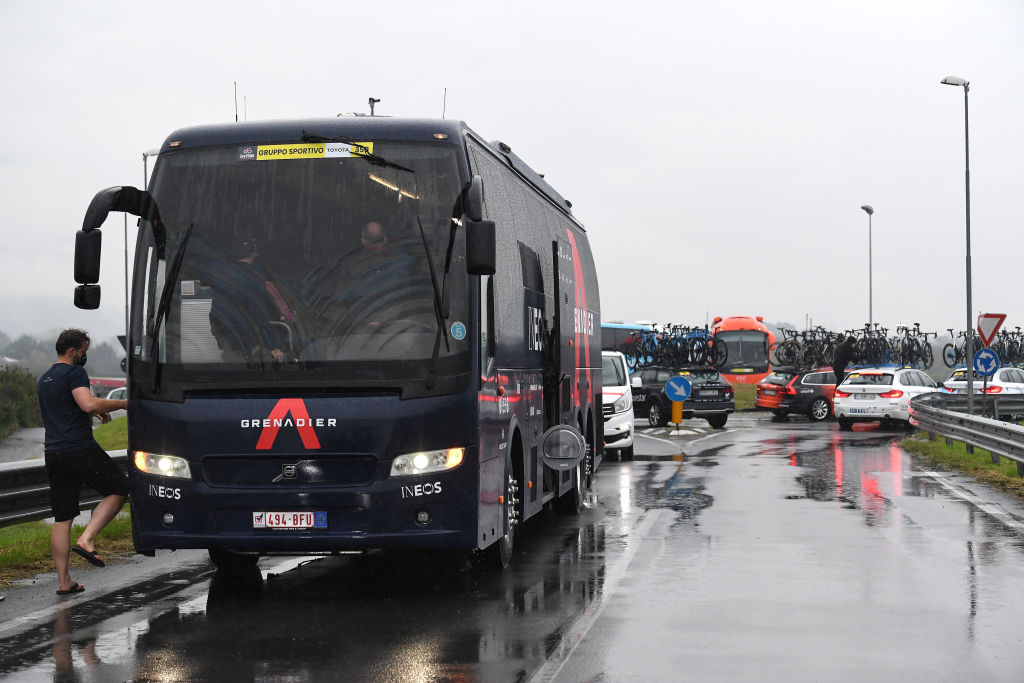Giro d'Italia director defends 750km transfer amid environmental concerns
'It's not only about one flight less or one flight more. We need to look at the whole footprint of the sport,' Vegni says

The Giro d'Italia organisers have dismissed suggestions that a planned 750km transfer to Rome for the final parade stage of the 2023 race is bad for the environment, with race director Mauro Vegni insisting that RCS Sport is doing enough to limit its carbon footprint and any damage to the environment.
The 2023 Giro d'Italia covers 3448km during the three weeks of racing around the Bel Paese. The final time trial is to Monte Lussari in the far northeast of Italy, with the race entourage then transferring roughly 750km south to the capital Rome for a final circuit stage. Riders and staff will make the transfer by a charter flight with hundreds of team and race vehicles likely to drive the long transfer.
The 2023 Giro d'Italia was expected to end in Trieste in the northeast but eventually opted for Rome, apparently for financial reasons and a three-year deal with the capital.
Climate protesters stopped the Tour de France during stage 10 this year and there is a growing debate about the footprint of professional cycling and what can and should be done about it.
Vegni dismissed questions about the final 750km transfer to Rome.
"I don't think one charter flight from the north of Italy to Rome is any worse than the thousands of scheduled flights that are taken every day. What's the solution? Stop flying? I think that's a sterile polemic," Vegni told Cyclingnews.
"There are lots of ways to respect and help the environment, it's not only about one flight less or one flight more. We need to look at the whole footprint of the sport, sit down together and decide what we can do about it."
Get The Leadout Newsletter
The latest race content, interviews, features, reviews and expert buying guides, direct to your inbox!
RCS Sport uses some electric vehicles and does some recycling but the Giro d'Italia caravan includes hundreds of vehicles and thousands of people travelling around Italy.
Vegni highlighted that the Giro d'Italia is far smaller than the Tour de France and other major sporting events, with fewer transfers between stages.
"Apart from the final transfer to Rome, we've reduced the transfer to the bare minimum. We're also working on our recycling and have done a lot to help the environment. We can always do more but I think we're doing a lot," he insisted.
Vegni was also dismissive about the annual debate about which Grand Tour contenders will and won't ride the 2023 Giro d'Italia.
The 70.6km of time trials seems a way to entice Remco Evenepoel and perhaps Primož Roglič to ride the 2023 Giro d'Italia but the mountain stages are also demanding. Vegni naturally considers his race more important than the riders.
"I think Remco could ride next year's Giro but I've got to admit that I'm a bit bored with all the talk about who will and who won't ride the Giro. That's not what cycling is about," he said.
"Riders come and go, great races like the Giro d'Italia, the Tour and the Vuelta remain. It's the races that make the riders famous, not the other way around. If this year's Tour de France winner Jonas Vingegaard hadn't won the Tour, nobody would be speaking about him as they are now. So whoever rides and wins the Giro is a great rider."
Vegni proudly considers the Giro d'Italia the hardest of the three Grand Tours even if the Tour de France is far more important in the sport.
"Nothing against the other races but the Giro is widely considered the hardest Grand Tour of all," he said.
"Other races might have more pressure, more visibility and raise more expectations but the Giro is second to know when it comes to the beauty and the difficulty of the route.
The Giro is a combination of two things: it's a great race but also shows off the beauty of Italy, its culture and lifestyle. Cycling combines sport and culture in a unique way."

Stephen is one of the most experienced member of the Cyclingnews team, having reported on professional cycling since 1994. He has been Head of News at Cyclingnews since 2022, before which he held the position of European editor since 2012 and previously worked for Reuters, Shift Active Media, and CyclingWeekly, among other publications.